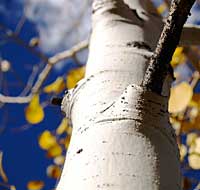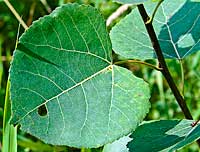




|
Quaking Aspen is known by many names, including white poplar, Cottonwood, and Balsam Poplar. The well known Balm of Gilead was actually the buds of the Balsam Poplar. Quaking Aspen (Populus tremuloides) is indigenous to North America, where it was considered a major healing herb by Native Americans. With antioxident, tonic, diuretic, analgesic, anti-inflammatory, astringent, antiseptic, and disphoretic properties, quaking aspen was utilized in the treatment of many ailments.
The Ojibwe used the bark for poulticing a sore arm or leg; the Cree Indians used the inner bark as a mild purgative; the Seneca used the bark a sedative; the Chippewa used the root to prepare a tea that curbed excessive flowing after childbirth, or to prevent premature birth.
Quaking aspen is particularly useful in the treatment of arthritis and rheumatism, easing the pain and swelling that accompany them. It is reported to be as effective as aspirin in reducing fevers, headaches, sore throats, gastro-intestinal disturbances, and other ailments, but because its absorption is slower and more dispersed, it is usually better tolerated than aspirin.
|